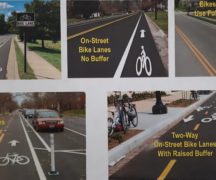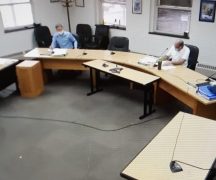By JAN LARSON McLAUGHLIN
BG Independent News
Words matter. The proposed Bowling Green charter amendment is intended to give the community rights to a healthy environment and livable climate. But while that may be the intent, critics say the words go far beyond those reasonable rights.
The wording of the charter amendment may be difficult for voters to digest. The supporters interpret it as giving citizens a right to peaceably protest projects such as the Nexus pipeline that is planned near Bowling Green’s water treatment plant. But others see the wording as so open to interpretation that it goes far beyond what most city residents would want.
It hardly seems possible the two sides of the Bowling Green charter amendment issue are talking about the same two pages of text when they describe the proposal.
Lisa Kochheiser and Brad Holmes, of the Bowling Green Climate Protectors, see the charter amendment as a way for citizens to intervene if the city does not adequately protect its citizens from harm to their environment.
“We’re not trying to overthrow the government. We want to strengthen our government by adding to citizen rights,” Holmes said.
The majority of people don’t want pipelines in or near their communities, he said. “This is going to be the most tangible way of people legally protesting.”

Bowling Green City Attorney Mike Marsh shares concerns about charter amendment.
City attorney Mike Marsh doesn’t want pipeline in the city either. And if there were a ballot issue to not allow Nexus on city land, he would support it.
But the charter amendment goes far beyond that, he said.
“It’s a far reaching, almost anarchy type of proposal,” Marsh said. “It allows citizens on their own to take actions they deem necessary to protect the environment. It’s up to anybody’s interpretation.”
Kochheiser said the charter amendment will allow citizens to protest a pipeline or other threats to the environment by peaceful protests, like a sit-in or forming of human chains.
“This gives us the right to do it without the threat of being thrown in jail,” she said.
“We’re not going to be throwing rocks. We’re not going to be looting,” Holmes said.
But the charter amendment draws no lines at the types of “non-violent direct action” that would be allowed. If people found the transportation of fuel tanker trucks to be a threat, “you could have a sit-in on I-75,” Marsh said. “That would be non-violent, but it would create chaos.”
And if a citizen doesn’t approve of a neighbor’s use of fertilizer on their lawn, they would have the right to flood their neighbor’s lawn. The charter amendment prohibits the police from stopping such actions, he said.
“I don’t believe the proponents we see every week at city council are aware of the ramifications,” Marsh said. “I think they’re well meaning people.”
But there is a definite lack of trust between the two sides on this issue. Kochheiser said city officials were aware of the Nexus pipeline proposal for months but were unwilling to take action to stop it.
“The city resisted this for months,” she said. “We wasted a tremendous amount of time.”
City Council, however, did take action to deny easements to the pipeline, which gave the city more time to study the issue. Mayor Dick Edwards brought in a panel of experts to discuss the threats from the pipeline, and has written letters to legislators and the Ohio EPA expressing concerns.
The Bowling Green Climate Protectors didn’t ask for the city’s input or advice on the proposed charter amendment, Marsh said.
“I would have told them how they could make this something that would withstand a constitutional argument,” he said.
Even if the charter amendment makes it on the ballot (it is currently being contested in the Ohio Supreme Court) and even if voters pass it in November, Marsh does not believe it will pass the constitutionality test.
The wording can be interpreted to limit interstate commerce, and restrict state and federal law enforcement in addition to Bowling Green Police Division. It goes beyond what most people want, he said.
“It gives rights not just to the people of Bowling Green. The ecosystem has rights,” he said. “I don’t think if it were adopted by voters it would pass the constitutionality test.”
But Kochheiser said the charter amendment is being twisted into something it’s not.
“This is not a state of anarchy. We’re just trying to protect ourselves from these major risks to our health and safety,” she said. “It’s very ideological, but at the same time, it’s urgently needed. Right before our eyes, our rights are being stolen.”
“As it stands, we do not have a right to say ‘No’ to the Nexus pipeline. We don’t have a right to protect our lives,” she said. The charter amendment allows the people to step in if the city does not adequately protect environmental health. “This would only happen if the city failed to enforce it. If they for some reason decide not to, somebody’s going to have to do it.”
The charter amendment does not prevent gas lines serving city residents and businesses, she added.
“If it’s going to benefit the people here in Bowling Green, it’s acceptable,” Kochheiser said.
“We’re not trying to raise people’s gas bills. We’re not trying to make it hard to get,” Holmes said.
The charter amendment is not fully focused on Nexus.
“This won’t necessarily stop the Nexus pipeline,” Holmes said. But with more and more pipelines sending natural gas from the Marcellus and Utica shale areas, Wood County is proving to be a popular route for the gas to get to Canada.
“This is for future generations,” Kochheiser said. “This is just the beginning.”
Holmes and Kochheiser pointed to the recently passed Waterville charter amendment which is giving that community the right to stop Nexus from using city roads during the construction process.
Bowling Green city officials are quick to point out that the Nexus pipeline has no plans to go through the city. And at the last City Council meeting, council member Bob McOmber said the amendment has no place in the Bowling Green City Charter, which up until now has been preserved for city government operations.
The issue would be better handled as an ordinance – such as the anti-discrimination ordinances that were passed by city voters a few years ago, he said. By teaming with council, the group could have worked on language that is acceptable to both sides, McOmber said. He surmised it would not have been difficult for the anti-pipeline citizens to get support from the majority of council.
Also last week, the city released an official statement about the proposed charter amendment, which echoed McOmber’s concerns about the city charter.
“The current charter amendment is being proposed as a direct result of a natural gas pipeline that is in Middleton Township, roughly nine miles outside of the City of Bowling Green. The Bowling Green City Charter is not an issues based document. The charter establishes the framework for city government operations,” the city’s statement read.
“The proposed amendment would materially change the charter and drastically alter the basic framework of our city government, how it operates, and how all laws are enforced. The BG community has historically rejected placing issues in the charter; rather, the community has chosen to openly debate such issues during public meetings and allowing City Council to vote on such issues,” the statement continued.
“The city periodically reviews its charter with a non-partisan citizen-led committee. The mayor and City Council have discussed forming a Charter Review Committee to examine the document through a cooperative and open process bringing together voices from throughout the community,” the official statement concluded.
But Kochheiser and Holmes said their decision to go for a charter amendment rather than an ordinance was intended to give the issue more permanence.
“If City Council passes an ordinance, it can rescind it with the stroke of a pen with the vote of four people,” Kochheiser said. “This is so much more powerful because it’s the will of the people themselves.”
“Ordinances get revised all the time,” Holmes said.
But Marsh said city charter amendments can also be changed. “Council can put a charter amendment on the ballot very easily.”
As far as the city’s desire to preserve the city charter for governmental mechanics, Holmes and Kochheiser objected to that limited use of the charter.
“I believe that unless we can protect our community, what good is the charter going to do us,” Kochheiser said. “Is a piece of paper more important than the people?”
“It’s the people’s constitution,” Holmes said.
According to Marsh, six or seven such environmental protection charter amendments were petitioned for this year in cities throughout Ohio. Wood County Board of Elections was the only one to allow the issue on the ballot, he said. All of the petitions are currently being protested at the Ohio Supreme Court.
Marsh said he was asked if a summary of the charter amendment could be placed on the voting ballots in Bowling Green, since the amendment is so long. However, he found the summary to be “misleading,” and insisted that the entire amendment be on the ballot so voters could see exactly what they are voting on.
“I thought people ought to see the whole thing,” he said.
Following is the full text of the proposed charter amendment:
PETITION FOR SUBMISSION OF PROPOSED AMENDMENT TO CHARTER
To the Council, the Legislative authority of the City of Bowling Green, Ohio: We, the undersigned, qualified electors of the City of Bowling Green, Ohio, respectfully petition the legislative authority to forthwith provide by Ordinance, for the submission to the electors of the City of Bowling Green, Ohio, the following proposed amendment to the Charter of the City of Bowling Green, to-wit:
Whereas, we the people of Bowling Green recognize that the continued extraction of fossil fuels is causing increasing atmospheric greenhouse gas concentrations, which is causing climate destabilization, mass species extinction, and human suffering; and
Whereas, we the people of Bowling Green, recognize that both humans and the natural communities and ecosystems in Bowling Green, require clean air, water, and soil to thrive and flourish; and
Whereas, we the people of Bowling Green, through this amendment, seek to alter our form of government to restore a system of local government capable of securing our fundamental rights and deriving its just powers from our consent;
Therefore, we, the people of Bowling Green, adopt this charter amendment recognizing and protecting community rights to a healthy environment and livable climate:
COMMUNITY RIGHTS TO A HEALTHY ENVIRONMENT AND LIVABLE CLIMATE
(a) Right to a Healthy Environment and Livable Climate. The people of the City of Bowling Green, and the natural communities and ecosystems in Bowling Green, possess the right to a healthy environment and livable climate. That right shall include the right to be free from new infrastructure for fossil fuel transportation within the City of Bowling Green or on property owned by the City of Bowling Green, except for infrastructure to transport fossil fuels to end-users within Wood County.
(b) Right to Enforcement. The people of the City of Bowling Green, and the natural communities and ecosystems in Bowling Green, possess the right to enforce their rights expressed in this Amendment. If the City of Bowling Green fails to enforce or defend this Amendment, or, a court fails to uphold this Amendment, any person may enforce this Amendment through nonviolent direct action. If any appointed or elected official infringes upon the people of Bowling Green’s adoption of this Amendment through their right of democratic initiative power, any person may enforce these rights through nonviolent direct action. City of Bowling Green law enforcement, and cooperating agencies acting within the jurisdiction of the City of Bowling Green, shall have no lawful authority to surveil, detain, arrest, or otherwise impede persons enforcing these rights. “Direct action” as used by this provision shall mean any activities carried out to directly enforce the rights expressed in this Amendment.
c) Right to Enforcement Against Corporate Rights. Any corporation, or other business entity, that violates the rights in this Amendment shall not be deemed a “person” to the extent that such treatment would interfere with the rights enumerated by this Amendment, nor shall it possess any other legal rights, powers, privileges, immunities, or duties that would interfere with the rights, including the power to assert state or federal preemptive laws in an attempt to overturn this Amendment, or the power to assert that the people of the City of Bowling Green lack the authority to adopt this Amendment.
(d) Right of Local Community Self-Government. The people of the City of Bowling Green possess the right of local community self-government, as expressed in the Declaration of Independence, the United States Constitution’s preamble and Ninth Amendment, and the Ohio Constitution’s Bill of Rights, sections I and II and section 20 the reservation of legislative powers to the people. The people’s right of local community self-government includes their power to use their governments to protect their rights, health, and safety, as done in this Amendment. Any form of government that becomes destructive of these ends is illegitimate and has no authority over the people.
(e) Right of Initiative Lawmaking. The people of Bowling Green possess the right to make law through local initiative processes. That right shall include the right to be free from interference with the exercise of that initiative power, which shall include any attempt to stop the placement of an initiative onto the ballot on the basis of claimed substantive illegality or unconstitutionality. The right shall also preclude any substantive review of an initiative’s contents before it is enacted into law.





